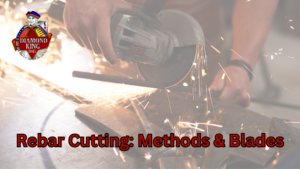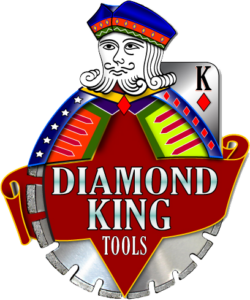Cutting rebar is a common task in construction, but choosing the right blade can significantly impact your efficiency, cost, and safety. In our latest YouTube video, we dive into the different methods of cutting rebar and the pros and cons of each. Here’s a recap of what we covered, including why we believe ductile iron diamond blades are the superior option.
Method 1: Cutting Rebar with Abrasive Wheels
Why People Choose Them
Abrasive wheels are a popular choice for cutting rebar because they:
- Offer good cutting speed: They can quickly slice through rebar, making them efficient for one-off or small-scale jobs.
- Are economical: These wheels are budget-friendly, making them accessible for most professionals and DIY users.
The Drawbacks
Despite their affordability and speed, abrasive wheels come with notable downsides:
- Short lifespan: Abrasive wheels wear out quickly, especially during heavy use.
- Safety concerns: These wheels can break apart during cutting, posing a safety risk.
- Dust production: Cutting with abrasive wheels generates a lot of dust, which can be harmful without proper protection.
Method 2: Cutting Rebar with Ductile Iron Diamond Blades
The Superior Option
Ductile iron diamond blades are our top recommendation for cutting rebar. Here’s why:
- Exceptional lifespan: These blades can last 50–100 times longer than abrasive wheels, depending on the application.
- Safety: Diamond blades are much less likely to break apart during use, reducing the risk of accidents.
- Efficiency: While they don’t match the cutting speed of abrasive wheels, their durability makes them a cost-effective choice over time.
Potential Considerations
The only tradeoff is that ductile iron diamond blades may cut more slowly than abrasive wheels. However, this is offset by their reliability and longevity.
Can Any Diamond Blade Cut Rebar?
Yes, any diamond blade can cut rebar, but there are important factors to consider:
- Lifespan: Diamond blades generally have a longer lifespan than abrasive wheels, provided they are used correctly.
- Segment melting: The primary issue when using diamond blades on rebar is segment glazing or melting. When segments overheat and glaze, the blade can no longer cut effectively. Proper cooling and technique are critical to prevent this.
Why We Recommend Ductile Iron Diamond Blades
After weighing the options, ductile iron diamond blades emerge as the superior choice for cutting rebar due to:
- Long-term cost savings: Their extended lifespan offsets the initial investment.
- Improved safety: They are more stable and less prone to breaking compared to abrasive wheels.
- Reduced maintenance: With proper use, they can handle heavy-duty cutting without significant wear or overheating.
Watch Our Video for More Insights
To see these cutting methods in action and learn more about the advantages of ductile iron diamond blades, check out our latest YouTube video:
Conclusion
Choosing the right blade for cutting rebar is essential for achieving the best results safely and efficiently. While abrasive wheels are a common choice, the longer lifespan, safety, and durability of ductile iron diamond blades make them the top recommendation.
Ready to upgrade your cutting tools? Visit Diamond King Tools to explore our high-quality diamond blades and see the difference for yourself!



